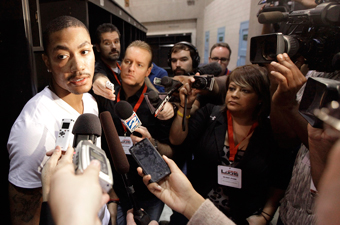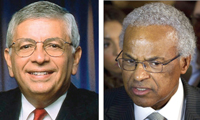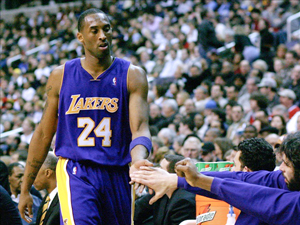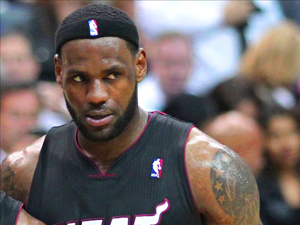NBA lockout ends, but is the future brighter?
By Jesse Muhammad -Staff writer- | Last updated: Dec 6, 2011 - 4:48:49 PM Chicago Bulls’ Derrick Rose, left, talks with reporters before the Houston Lockout Celebrity Basketball Game hosted by former NBA player and coach John Lucas, Sunday, Nov. 20, in Houston. Proceeds from the game benefi ted charities including the John Lucas Foundation, which helps athletes who need after care or wellness services and programs. Photo: AP Wide World Photos/David J. Phillip |
“It seems that the owners planned to start the season on Christmas all along and dragged the players through this lockout to get more money out of the deal. It was a business strategy. This is a game of money,” Exavier Pope, a Chicago-based sports and entertainment attorney, told The Final Call.
At one point it looked as if the entire 2011-2012 season would be completely cancelled. Some sports analysts even hinted that this was the end of the league.
 (l)NBA Comissioner David Stern (r) NBA union chief, Billy Hunter Photos MGNOnline |
Who will ultimately be the winner? Owners? Players? Fans?
Although the final details of the agreement were in line for inking and approval at Final Call press time, according to Mr. Pope, players could ultimately lose as much as eight percent of NBA basketball related income to owners, amounting to about $2.5 billion. The deal will also help some teams in struggling markets and the league will now be in a position to take advantage of millions in holiday advertising dollars.
“Christmastime is usually when everyone starts truly paying attention to the NBA anyway and that’s why Christmas is the largest day for NBA advertisers and generates major revenue. That will help the league make up for money they lost. It’s all strategy and the owners know that,” said Mr. Pope, who is also a legal analyst and blogger.
Afraid to use the B-word?
Black players will get back to dunking the Spalding, filling stadium seats, selling jerseys and earning their million dollar paydays but a question continues to be raised: How can the wealth and influence of athletes, and even entertainers, be unlocked to help Black America?
There’s still a dire need for affordable, safe and clean housing; urban schools need books and adequate buildings; Black colleges are struggling to pay their bills; the Black unemployment rate continues to climb; and programs that provide youth with alternatives to violence are chronically underfunded.
“We have a serious problem with being able to recycle the talent and dollars of our own Black community. Our athletes have been conditioned to go to White colleges, overlook the Black colleges, and to enrich the new plantations of the sporting world. Doing something with and for their own people is not even on the table most of the time,” speaker and author George C. Fraser told The Final Call.
Mr. Fraser is the CEO of FraserNet Inc., a global networking movement of 51,000 members focused on increasing opportunities, wealth and jobs for Blacks.
“All of the athletic talent of our Black athletes and the money they earn is being used to enrich football and basketball programs at White colleges. And then they go on to enrich the professional sporting industry. Over the next 20 years, we will lose more and more of our Black colleges because our star talent won’t attend those schools anymore,” said Mr. Fraser.
The sporting industry generates an estimated $500 billion annually. Blacks make up only 13 percent of the United States population, but Black athletes are 80 percent of NBA players, 67 percent of the National Football League players and 9 percent of Major League Baseball players.
 Black NBA superstars like Kobe Brayant possess cross-cultural fan appeal. Photos: MGNOnline |
The Honorable Minister Louis Farrakhan, in a major three-part lecture series titled, “Who Are the Real Children of Israel?” pointed out how Black entertainers, celebrities and sports figures have been exploited, dying broke while their managers and owners end up rich.
“The old strategy was ‘let them die broke,’ but today, they’ve developed a new strategy: ‘Let’s make our Negroes rich’… See it’s like a plantation; you’re just a piece of meat throwing balls in a hoop. You’re a rich slave, you’re sharecropping again,” the Minister said.
During the majority of his messages throughout this year, Min. Farrakhan has been relentless in urging Black people to pool financial resources to buy land, create jobs and stop waiting for others to do what Black America must do for itself.
In his Nov. 3 interview on Chicago’s Cliff Kelley Show, Min. Farrakhan said, “A man like Bob Johnson, who is a Black billionaire, who once owned the Charlotte Bobcats—a man like that: If he called together all the basketball players with their millions, the football players with their millions, the entertainers with their millions, and proposed to them that instead of putting their money in the stock market where the wise can manipulate the stock market (where you could have money today, and if the stocks crash, you lose lots of money in that); or stopping our basketball players from doing ‘little things’ that put back into the Black community, but uniting them and pooling their resources, this would allow us to put big things back into the Black community by creating jobs.”
“Now as I read in 2010 and 2009, our top hip-hop artists made $300 million a year. But in 2008, 14 of our top hip-hop artists made $515 million. The thing that we have is money, but we don’t have unity, and we don’t have a program that could make multi-millionaires the super rich billionaires of the future …” he said.
“You may say, ‘Well Farrakhan, maybe we can’t get these big, rich Negroes together to pool resources!’ I know we can; but then if we got none of them together, there are still 45 million of us. Think about this: If 40 million of us could manage five cents a day, 25 cents a week, $1 a month in a National Treasury, then after one year, we won’t have ‘millions or hundreds of millions’—in one year, we would have several billions of dollars in a National Treasury! And the first thing Elijah Muhammad said we have to do is buy us some land.”
“Our athletic talent is a major resource that we give away but we have to reverse that to regulate and take control of our resources. The same way people regulate and control oil, we have to regulate and control the athletic talent that comes out of our community so our people can benefit from it,” said Attorney Everett Glenn, CEO of the California-based Entertainment and Sports Plus firm.
 LaBron James drew criticism from NBA owners when he exercised his option to become a free agent and sign with the Miami Heat. |
They partnered to launch FraserNet’s Sports Authority, an initiative aimed at establishing a serious connection between Black professionals, organizations, businesses and Black professional athletes to help players maximize their personal development as men and wealth while becoming useful contributors to their community.
“We are on the same page with what I’ve been hearing from Minister Farrakhan. We’re saying the same thing just in different ways. Our people are financially illiterate. Not all, but most. We don’t know what to do with the money we have,” said Mr. Fraser.
In November, Mr. Fraser launched The MOSES (Making Our Selves Economically Successful) Project, a comprehensive step-by-step program designed to educate and motivate Blacks to become financially literate. The Moses Project Economic Summit is a 10-city tour that continues in 2012 to help one million Black people become debt free, excluding mortgages, and to get Blacks to agree to save at least $50 per month in three to five years.
“Imagine a world where our Black professional athletes hire only Black accountants and lawyers, support struggling Black institutions, build businesses in the community to provide jobs for Black youth, and do something more than just host sports camps; but build institutions and lasting wealth instead of wasting it away,” said Mr. Fraser.
“That’s one of the main reasons I got into sports and entertainment law because I wanted to present our athletes with a face that looks like theirs and to present a positive light,” said Mr. Pope, who is also the principal of The Pope Firm in the Windy City. “It is critical to give back to the community. The lockout presented an opportunity for the players to think about using their name and celebrity to do something for their own community. Some did.”
“We have to stop asking White folks to solve our problems. We have to do it ourselves. We have to marshal our resources now. No matter if you’re in church, mosque, or civil rights group, we have to recognize the resources that we have, regulate them, control them and build something for ourselves. And teach our athletes the importance of this early on before they make the pros,” advised Mr. Glenn.
“We have to break the slave mindset that makes us afraid to do something for our own Black people,” added Mr. Fraser.

No comments:
Post a Comment